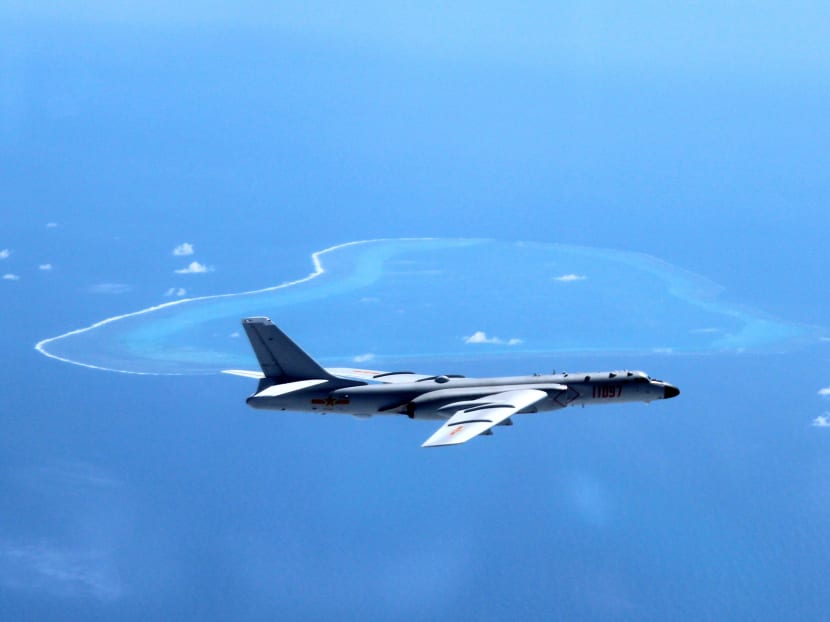China begins air patrols over disputed area of the South China Sea
BEIJING — China said on Monday (July 18) that it had begun what would become regular military air patrols over disputed islands and shoals of the South China Sea, highlighting its claim to the vast area a week after an international tribunal said Beijing’s assertion of sovereignty over the waters had no legal basis.

Undated photo of a Chinese H-6K bomber patrolling islands and reefs including Huangyan Dao in the South China Sea. Photo: XINHUA via AP
BEIJING — China said on Monday (July 18) that it had begun what would become regular military air patrols over disputed islands and shoals of the South China Sea, highlighting its claim to the vast area a week after an international tribunal said Beijing’s assertion of sovereignty over the waters had no legal basis.
China’s air force flew a “combat air patrol” over the South China Sea “recently,” Xinhua, the official news agency, reported, citing Mr Shen Jinke, an air force spokesman. The patrol consisted of bombers, fighters, “scouts” and tankers and would become “regular practice”, Mr Shen said, according to Xinhua.
The announcement of the air patrols, plus a separate statement that China would conduct military exercises in the South China Sea off the coast of Hainan Island, came as Adm John M Richardson, the chief of US naval operations, was in Beijing to discuss the South China Sea and other issues that arose after the tribunal rebuked China’s claims over the waters on July 12.
The landmark decision rejected China’s assertion that it enjoys historical rights over a huge area of the South China Sea encompassed by a “nine-dash line”. China had argued the court had no jurisdiction in the matter.
China’s announcement of military exercises and patrols as a response to the ruling had been expected by analysts. But Beijing also took moves to contain any public anger over the tribunal’s decision. The angry mobs of people demonstrating outside of embassies in the Chinese capital, a regular feature in the past when China wanted to vent its grievances, never materialised.
On Monday, Adm Richardson’s Chinese counterpart, Adm Wu Shengli, said that China would continue construction in the South China Sea. In the past two years, China has reclaimed thousands of acres on seven features in the Spratly Islands, an area where Vietnam, the Philippines and Taiwan also have claims, building ports, large airstrips and radar installations.
“We will never stop our construction on the Nansha Islands halfway,” Xinhua, in a separate report, quoted Adm Wu as saying, using the Chinese name for the Spratly chain. “The Nansha Islands are China’s inherent territory, and our necessary construction on the islands is reasonable, justified and lawful.”
Significantly, the Xinhua report on the air patrols said the flights encompassed the Scarborough Shoal, a fishing ground far to the north of the Spratlys off the coast of Luzon Island in the Philippines. China seized control of the shoal in 2012, using coast guard vessels to bar Filipino fishermen.
The tribunal ruled that China had violated what it said were the “traditional fishing rights” of Filipino fishermen in the area. The Xinhua article did not say when the air patrol took place and did not provide any details, other than saying that the bombers were H-6K aircraft, a modification of a decades-old Soviet design that carries air-launched cruise missiles.
China has not reclaimed land on Scarborough Shoal, a move that would likely inflame tensions with the Philippines as well as the United States.
And while Adm Wu reminded Adm Richardson about China’s position on the South China Sea, his remarks, coming only days after one of the most stinging rebukes to Beijing’s foreign policy in years, were moderated with calls for more cooperation between the world’s two biggest navies.
Highlighting agreements between the United States and China that sought to govern encounters between the two militaries in the air and at sea to help prevent accidental clashes, Adm Wu said that cooperation is “the only correct option”, Xinhua reported. THE NEW YORK TIMES





